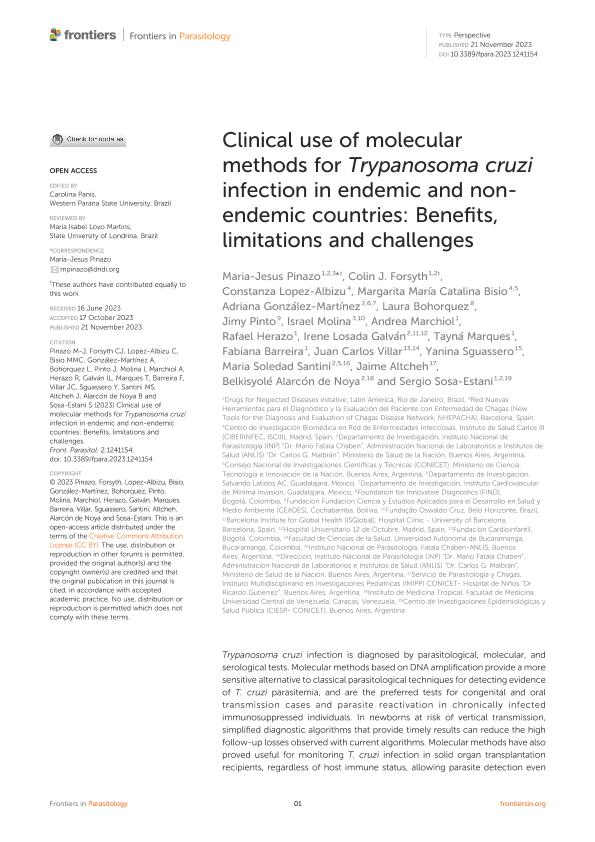Artículo
Clinical use of molecular methods for Trypanosoma cruzi infection in endemic and non-endemic countries: Benefits, limitations and challenges
Pinazo, Maria Jesus; Forsyth, Colin J.; Lopez Albizu, Maria Constanza; Bisio, Margarita María Catalina ; González Martínez, Adriana; Bohorquez, Laura C.; Santini, Maria Soledad
; González Martínez, Adriana; Bohorquez, Laura C.; Santini, Maria Soledad ; Altcheh, Jaime Marcelo
; Altcheh, Jaime Marcelo ; Alarcón de Noya, Belkisyolé; Sosa-Estani, Sergio Alejandro
; Alarcón de Noya, Belkisyolé; Sosa-Estani, Sergio Alejandro
 ; González Martínez, Adriana; Bohorquez, Laura C.; Santini, Maria Soledad
; González Martínez, Adriana; Bohorquez, Laura C.; Santini, Maria Soledad ; Altcheh, Jaime Marcelo
; Altcheh, Jaime Marcelo ; Alarcón de Noya, Belkisyolé; Sosa-Estani, Sergio Alejandro
; Alarcón de Noya, Belkisyolé; Sosa-Estani, Sergio Alejandro
Fecha de publicación:
11/2023
Editorial:
Frontiers Media
Revista:
Frontiers in parasitology
ISSN:
2813-2424
Idioma:
Inglés
Tipo de recurso:
Artículo publicado
Clasificación temática:
Resumen
Trypanosoma cruzi infection is diagnosed by parasitological, molecular, and serological tests. Molecular methods based on DNA amplification provide a more sensitive alternative to classical parasitological techniques for detecting evidence of T. cruzi parasitemia, and are the preferred tests for congenital and oral transmission cases and parasite reactivation in chronically infected immunosuppressed individuals. In newborns at risk of vertical transmission, simplified diagnostic algorithms that provide timely results can reduce the high follow-up losses observed with current algorithms. Molecular methods have also proved useful for monitoring T. cruzi infection in solid organ transplantation recipients, regardless of host immune status, allowing parasite detection even before symptom manifestation. Furthermore, in the absence of other biomarkers and a practical test of cure, and given the limitations of serological methods, recent clinical guidelines have included polymerase chain reaction (PCR) to detect therapeutic failure after antiparasitic treatment in chronically infected adults. Increasing evidence supports the use of molecular tests in a clinical context, given the improved sensitivity and specificity of current assays – characteristics which largely depend on epidemiological factors and genetic and antigenic variability among T. cruzi strains. Further development and registration of commercial PCR kits will improve the use of molecular tests. We discuss the attributes of PCR and other molecular tests for clinical management in people with T. cruzi infection.
Palabras clave:
CHAGAS
,
TRYPANOSOMA CRUZI
,
INFECTIONS
,
DIAGNOSTIC
Archivos asociados
Licencia
Identificadores
Colecciones
Articulos(SEDE CENTRAL)
Articulos de SEDE CENTRAL
Articulos de SEDE CENTRAL
Citación
Pinazo, Maria Jesus; Forsyth, Colin J.; Lopez Albizu, Maria Constanza; Bisio, Margarita María Catalina; González Martínez, Adriana; et al.; Clinical use of molecular methods for Trypanosoma cruzi infection in endemic and non-endemic countries: Benefits, limitations and challenges; Frontiers Media; Frontiers in parasitology; 11-2023; 1-8
Compartir
Altmétricas



